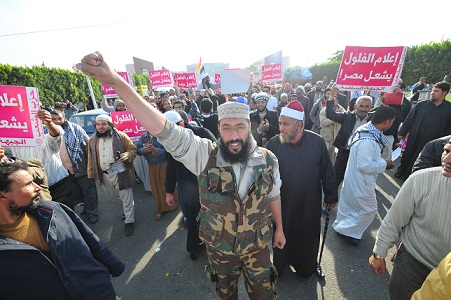CAIRO: Egyptian presidential hopeful Mohamed ElBaradei indicated he would agree to head a new government if asked, as Egypt’s military leader scrambled to defuse a political crisis ahead of Monday’s landmark poll.
Egyptian activists on Saturday called for a million-person march, on the eve of the first parliamentary elections since the mass uprisings that drove Hosni Mubarak from power in Febraury, to demand the end of military rule.
The call follows a week of bloody clashes between protesters and police that have left at least 42 people dead and more than 3,000 injured, and have piled pressure on Egypt’s ruling Supreme Council of the Armed Forces led by Field Marshal Hussein Tantawi.
Earlier, a 19-year-old demonstrator was killed after a protest outside the cabinet headquarters in Cairo against military leader Tantawi’s appointment of Kamal Al-Ganzuri as the country’s new prime minister, following the resignation the interim cabinet last week.
The protesters massed in nearby Tahrir Square, the epicenter of protests that toppled Mubarak, have repeatedly proposed ElBaradei to lead the transition to democratic rule.
After holding talks with Tantawi, the former UN nuclear watchdog chief said he was "ready to renounce the idea of being a candidate in the presidential election if officially asked to form a cabinet", according to a statement by his office.
Tantawi also held talks with ex-Arab League chief Amr Moussa, another presidential hopeful.
But the thousands of protesters flocking to Tahrir Square over the past week have made it clear that they will not leave until Mubarak’s former defense minister steps down.
The Revolution Youth Coalition calling Sunday’s nationwide protests is also demanding the replacement of Ganzuri and his yet to be appointed cabinet with a national salvation government and the immediate trial of all those involved in killing demonstrators.
Ganzuri has tried to assure Egyptians that the military has given him more powers than past premiers, in a bid to placate protesters who accuse the Supreme Council of the Armed Forces (SCAF) of trying to retain control.
Despite the SCAF’s insistence that it will guarantee their security, the latest political upheaval threatens to eclipse the upcoming elections, which many demonstrators now regard as a distraction from the pressing issues facing Egypt.
Another factor that risks undermining Monday’s ballot is the labyrinthine voting, through which 498 candidates will be elected in the People’s Assembly, with another 10 candidates being appointed by the country’s ruler.
The prime minister-designate said he would formalize his government "before the end of next week" and allocate some portfolios to younger people.
But the mostly young protesters in Tahrir Square quickly rejected the appointment of Ganzuri, who served as premier under Mubarak in the 1990s.
"We do not want someone who has been selected by the military council, we want a civilian who was with us in Tahrir during the revolution, someone who has the confidence of the people," said one, Omar Abdel Mansur.
Hundreds of demonstrators in the square branched off to the nearby cabinet offices on Friday to block Ganzuri from entering the building, chanting "revolution" and "Ganzuri is a former regime leftover".
They were bolstered by an announcement that the grand imam of Al-Azhar, Sunni Islam’s highest authority, had thrown his weight behind them.
"The grand imam (Sheikh Ahmed Al-Tayyeb) backs you and is praying for your victory," senior aide Hassan Shafie told them during a visit to the square, focus of huge protests first against Mubarak and now the army.
ElBaradei also joined protesters in the square on Friday.
But the Tahrir protest was countered by a rival demonstration in a square about three kilometers away, where more than 10,000 people gathered to show support for the military, chanting "Down with Tahrir".
The rallies came ahead of the first parliamentary elections since Mubarak’s ouster left the military in charge.
The SCAF led by Tantawi has said repeatedly it does not have political ambitions and plans to hand power to an elected civilian authority after presidential elections set for no later than the end of June 2012.
But it has also insisted it will not bow to pressure from the Tahrir protesters, saying they do not represent the whole country.
Washington, a close ally of Egypt, has called for a quick transfer to civilian rule. And UN chief Ban Ki-moon renewed calls for the military to ensure a "peaceful transition" after telephone talks with Tantawi.
